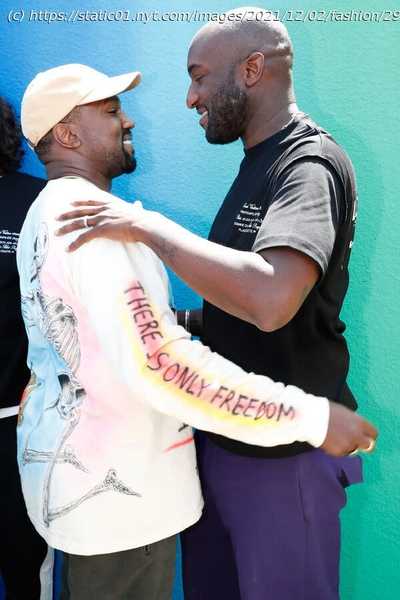Look around at the way young men now think about clothes, design and music, and you’ll see him everywhere.
In recent years, it could often appear as if there were several Virgil Ablohs, all working at the same time. There were the multiple annual collections of Louis Vuitton, where he was the artistic director of men’s wear, and Off-White, his own label, which he’d founded while still in the orbit of Kanye West. There were the seemingly endless collaborations, with brands as disparate as Nike, Ikea, Evian, Rimowa, Vitra, Chrome Hearts and more. And perhaps just as important, there were his daily Instagram missives. Seemingly no one posted more than he did — a couple dozen images on his story, easily, consisting of new designs, new music, screen grabs of conversations, fit pics posted by the super-famous, fit pics posted by the unknown. He was a geyser of ecstatic creativity. What he was doing wasn’t flaunting his ubiquity and success, but rather offering up the blueprint for how to replicate it. The community of ideas doesn’t meet in private, he knew; it was fortified by exposure to sunlight and scrutiny. His mind was constantly churning, and his solution was to build an archive in real time, for everyone to absorb. Look around at the way young men now think about clothes, design and music, and the ways in which those pursuits all intersect: It’s hard not to see Abloh everywhere. Mr. Abloh, who died on Sunday at 41, repurposed this ethic from hip-hop and skateboarding, two cultural pursuits premised upon the provocative and ultimately correct misuse of what came before. He succeeded at the highest levels of luxury by importing the bootleg, the remix, the alternate point of view. Crucially, Mr. Abloh was part of a generation raised to believe it was entitled to the luxury that high fashion houses offered, an idea and agitation he inherited from West. In his framing, though, the difference between those on the inside and those on the outside looking in was only a matter of who had placed the window, and where. Mr. Abloh simply shattered that window. In this, he was part of a profound lineage. Since the 1980s, hip-hop had been doing shadow work in boosting the power and cultural relevance of high fashion, whether it was Dapper Dan’s cut-and-sew remakes in the 1980s or the Notorious B.I.G.’s embrace of Versace in the 1990s or ASAP Rocky’s early 2010s gestures to the avant-garde. And yet there had never been a designer of the hip-hop generation — to say nothing of a Black designer — at the head of a French luxury house until Mr. Abloh took over Louis Vuitton in 2018. He became an ambassador, and an infiltrator. In recent years, plenty of high-fashion companies have attempted to incorporate hip-hop language or swagger or silhouettes into their collections, but those conversations have generally felt strained, clearly the product of observation. Mr. Abloh’s contributions were a product of immersion. In Louis Vuitton stores right now, for example, there is a stunning pattern-quilted leather jacket inspired by the ones made by the Detroit store Al Wissam that were a hip-hop staple at the end of the 1990s into the early aughts.






